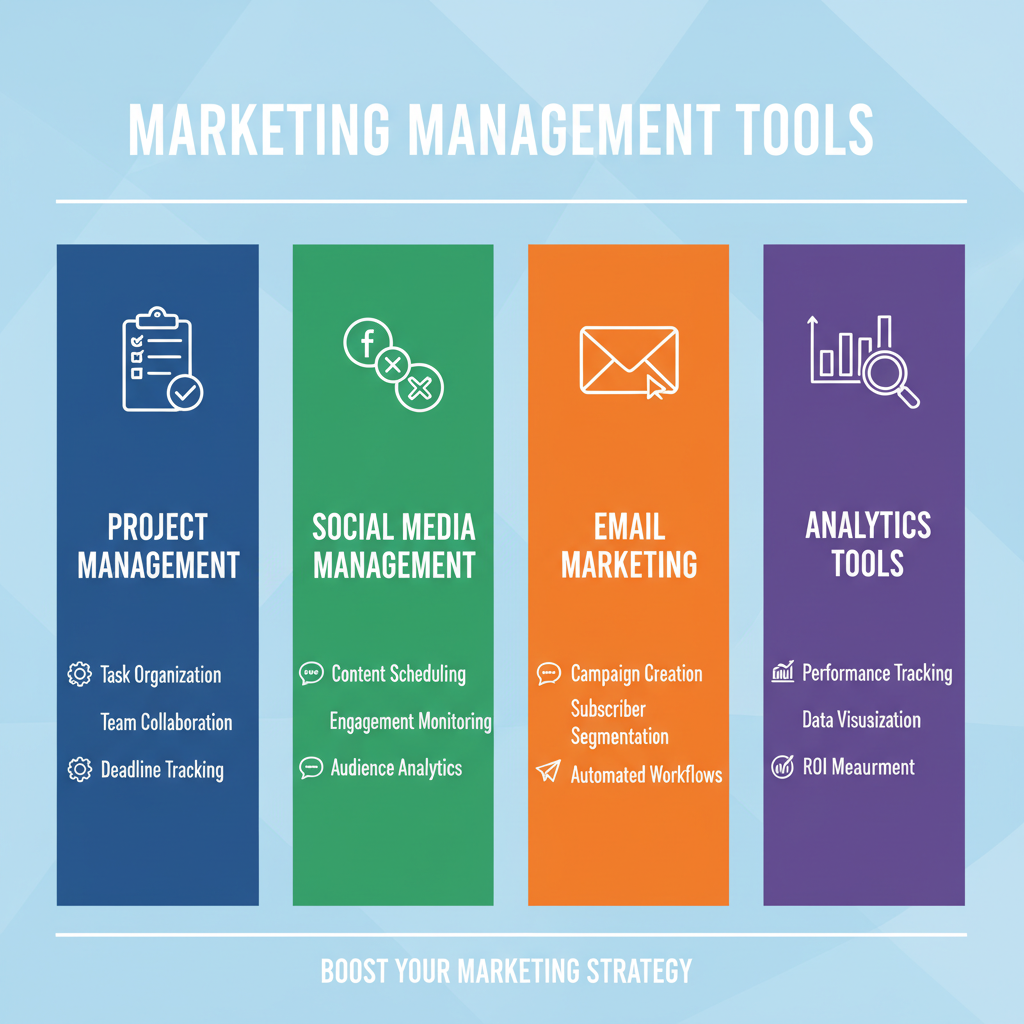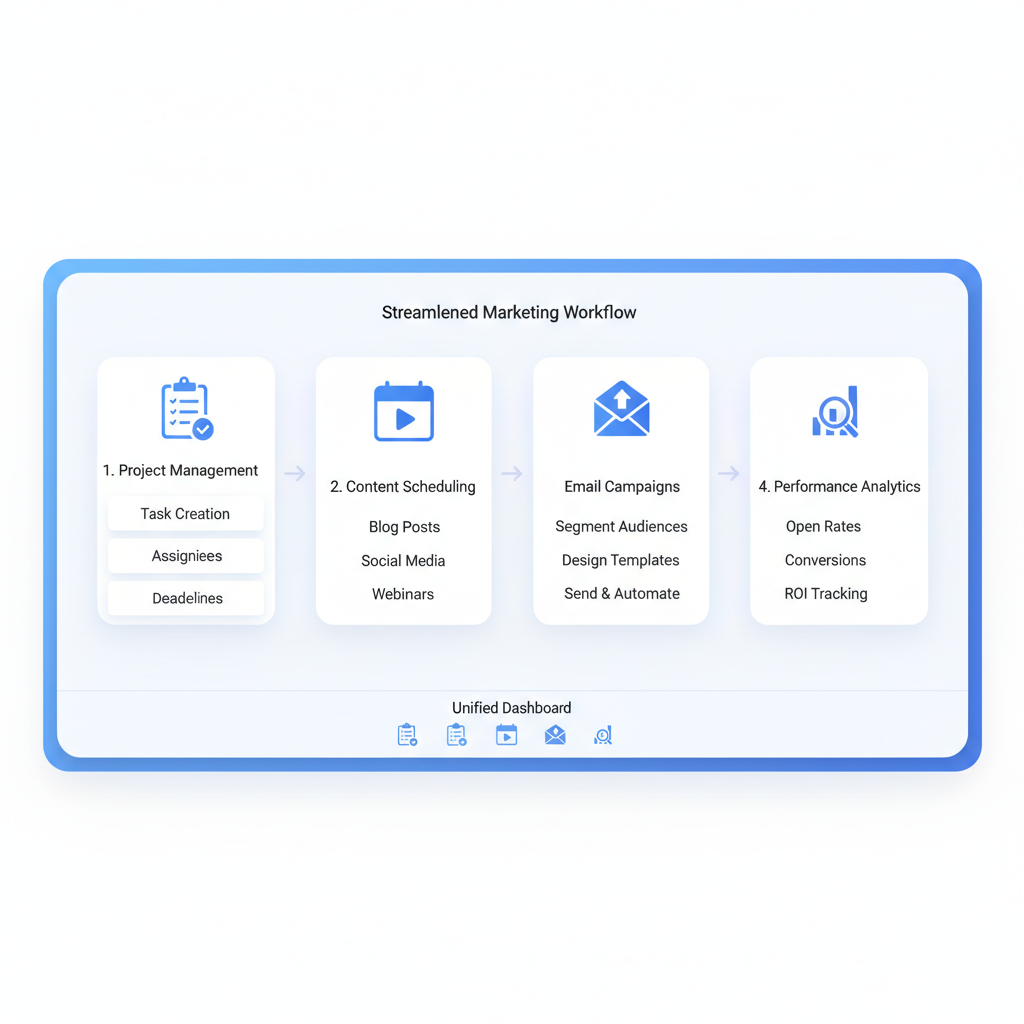Top Marketing Management Tools to Boost Workflow Efficiency
Discover top marketing management tools to streamline workflows, boost collaboration, and enhance campaign performance across multiple channels.

Top Marketing Management Tools to Boost Workflow Efficiency
In today’s fast-paced digital marketplace, marketing management tools are essential for businesses aiming to streamline processes, improve team collaboration, and achieve measurable results. These platforms enable marketers to plan, execute, and optimize campaigns across multiple channels while maintaining alignment with strategic goals. Choosing the right toolkit can deliver higher ROI, boost productivity, and help you stay ahead of the competition.
Whether you’re a startup scaling your operations or an enterprise refining established workflows, the right combination of tools can transform your marketing performance.

---
What Are Marketing Management Tools and Why They Matter
Marketing management tools are software solutions designed to help professionals plan, coordinate, execute, and measure marketing activities. They provide structure, enhance communication, and ensure decisions are driven by accurate data.
Why they matter:
- Centralized operations: Manage everything from brainstorming to reporting in a single platform.
- Enhanced collaboration: Allow multiple stakeholders to work together seamlessly.
- Time savings: Automate repetitive tasks to focus on strategic initiatives.
- Performance tracking: Use analytics to refine approaches for better outcomes.
---
Key Features to Look for in Marketing Management Software
When comparing platforms, prioritize these must-have features:
- Collaboration Tools: Shared boards, real-time messaging, and file sharing.
- Task Management: Assign, prioritize, and track progress with clear deadlines.
- Integration Support: Connect easily with CRM, analytics, and other business systems.
- Automation: Minimize manual tasks such as social media posting and reporting.
- Customizable Dashboards: Visualize the KPIs most relevant to your goals.
---
Major Categories of Marketing Management Tools
To simplify selection, most marketing management tools fall into these categories:
1. Project Management Platforms
Ideal for organizing campaigns, allocating resources, and coordinating teams.
2. Social Media Management Tools
Help schedule, publish, and analyze social content effortlessly.
3. Email Marketing Platforms
Enable creation, delivery, and tracking of targeted email campaigns.
4. Analytics and Reporting Tools
Provide insights into campaign performance and areas for improvement.
---
Top Project Management Tools for Marketers
Marketing projects often involve multiple stakeholders and deliverables. These leading tools help maintain clarity and order:
Trello
A visual, board-based platform great for SMBs. Drag-and-drop cards make rescheduling tasks simple.
Pros:
- User-friendly
- Flexible structure
Cons:
- Limited analytics in free plan
Asana
Robust and scalable, Asana handles complex, multi-campaign workflows.
Pros:
- Extensive integrations
- Powerful timeline and calendar views
Cons:
- Learning curve for new users
Monday.com
Customizable templates and workflow automation make it suitable for teams with specific needs.
Pros:
- Highly adaptable
- Intuitive interface
Cons:
- Premium features come at higher cost

---
Leading Social Media Marketing Tools
Consistent and engaging social presence is easier with these platforms:
Hootsuite
A well-established scheduling, monitoring, and analytics solution.
Standout Feature: Unified inbox for all social engagements.
Buffer
Streamlined interface that’s easy for newcomers.
Standout Feature: Clear, isolated analytics for each post.
Sprout Social
Premium platform with advanced social listening and audience insights.
Standout Feature: CRM-like features alongside detailed engagement reports.
---
Powerful Email Marketing Platforms
Email marketing continues to deliver exceptional ROI. Consider these top performers:
Mailchimp
Beginner-friendly with a generous free tier.
Best For: Small businesses launching quickly.
ActiveCampaign
Combines automation with rich personalization tools.
Best For: Marketing teams optimizing customer journeys.
HubSpot
Comprehensive suite integrating email, CRM, and inbound marketing.
Best For: Enterprises needing an all-in-one platform.

---
Analytics and Reporting Tools for Marketers
Data-driven marketing starts with accurate tracking:
Google Analytics
Free and feature-rich analytics for monitoring website performance.
Best For: All businesses wanting traffic source and conversion data.
SEMrush
A full SEO, PPC, and competitor research toolkit.
Best For: Those targeting organic growth and market insights.
---
Integration Capabilities and Automation
Strong integrations and automation save time and enhance efficiency. Your chosen tool should connect with:
- CRM systems (Salesforce, HubSpot)
- Collaboration platforms (Slack, Google Workspace)
- E-commerce systems (Shopify, WooCommerce)
- Analytics dashboards (Google Data Studio, Tableau)
Possible automations include:
- Triggering personalized email campaigns.
- Publishing posts across platforms at optimal times.
- Syncing leads from forms to CRM instantly.
---
Factors to Consider When Choosing Tools
| Factor | Why It Matters |
|---|---|
| Budget | Ensures affordability and long-term sustainability. |
| Team Size | Determines scalability and collaboration requirements. |
| Marketing Goals | Aligns features with measurable outcomes like lead generation. |
| Technical Skills | Limits or expands the complexity of tools you can adopt successfully. |
---
How to Test and Choose the Right Tool
- Identify Needs: Map campaign workflows and pain points.
- Shortlist Candidates: Screen based on feature set and compatibility.
- Leverage Free Trials: Test usability and UX before committing.
- Get Team Feedback: Gather perspectives from all potential users.
- Check Support Options: Ensure availability of onboarding resources.
---
Best Practices for Implementing New Tools
- Start with a Pilot: Run a small campaign to confirm fit.
- Provide Training: Use live demos or video guides.
- Maintain Documentation: Standardize usage with clear SOPs.
- Review and Optimize: Assess results after 30–60 days and adjust settings.
---
Conclusion and Next Steps
The right marketing management tools can transform your workflows by boosting efficiency, collaboration, and strategic clarity. Smaller businesses might benefit from a compact toolkit of Trello, Buffer, Mailchimp, and Google Analytics, while larger teams may find Monday.com, Sprout Social, HubSpot, and SEMrush better suited to complex operations.
Start by defining your marketing objectives, then shortlist tools that directly support those aims. Test, train, and integrate thoughtfully to maximize impact.
Ready to streamline your campaigns? Evaluate your current setup, trial a top-rated platform, and start experiencing measurable improvements in your marketing efficiency today.


